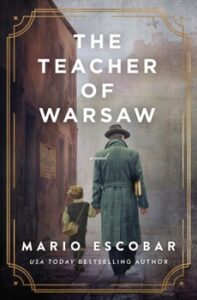By Mario Escobar; reviewed by Jeannette Hartman
 Mario Escobar based this poignant novel on the life of Henryk Goldszmit, better known as Janusz Korczak, a Polish teacher and orphanage director in Warsaw.
Mario Escobar based this poignant novel on the life of Henryk Goldszmit, better known as Janusz Korczak, a Polish teacher and orphanage director in Warsaw.
The book opens in the late 1930s with war with Germany looming over Poland. Korczak is director of the Jewish orphanage Dom Sierot at Krochmaina 92.
Helping him is Stefania (Stefa) Wilczynska, whom he first met in 1909 when they both worked for an orphan aid society and a dozen teachers and child carers. Their responsibilities and challenges grow with the war. The bombing of the city leaves more and more children without parents.
Escobar recreates scenes and conversations as Korczak and Stefa struggle to get food and supplies for the children from the government and social work organizations. They debate about the war and what it will bring to their work. The book reads like a diary without daily dated pages. (Korczak himself kept a diary but only for a few months in 1942.)
Korczak grew up in an assimilated Jewish family with a father who spent the last six years of his life in a mental institution. Fearful that he might become mentally ill — or might pass mental illness on to his children, Korczak never married or had children.
He trained as a pediatrician but decided he could contribute more as a teacher than as a doctor. In 1912, he opened Dom Sierot, a Jewish orphanage based on his own design.
He wrote children’s stories and nonfiction works on children’s rights, education and experience of life in a world run by adults as well as doing a radio program about educating and raising children. He believed children should have autonomy and responsibility and created what he called a Republic of Children, in which they would participate in a legislature, trials and decision-making.
This is, unfortunately, a book where the reader knows the outcome from the first page. Korczak, Stefa, the orphans and their teachers and caregivers were forced to leave Dom Sierot and move into the Warsaw Ghetto on Nov.30, 1940.
Less than two years later, on Aug. 5, 1942, the Germans order Korczak, his staff and the 200 children they cared for to report for deportation. Korczak had repeatedly been offered places of safety or ways to leave the ghetto and had always refused to leave his children.
Witnesses that day describe the children walking down the ghetto street two by two, wearing their best clothes and carrying a blue knapsack and a favorite toy or book. To keep them calm and feeling secure, Korczak told them they were going on an outing to the country. They were taken to Treblinka and murdered.
The book provides brief glimpses of life in the ghetto: children dying of hunger on the street or alone in bed of typhus; at the same time, wealthy people lived in large apartments with food they purchased on the black market. Korczak tries to get young children placed in homes with Polish families outside the ghetto. While Escobar mentions the terrors of life inside the ghetto, he doesn’t turn Korczak’s story into a horror.
This isn’t a deep book. It doesn’t explore how Korczak found the fortitude to keep fighting against such daunting odds. The novel is a snapshot in time and a story of how one, elderly man inspired a small staff of people to care for 200 orphans in the darkest of circumstances.
THE TEACHER OF WARSAW is a story of courage and selflessness and dedication to protecting those most vulnerable.
Another book with a similar theme that might interest you is FRAULEIN RABBINER JONAS.
The Author: Mario Escobar (1971 – )
 Based in Madrid, Mario Escobar has written books and articles about the Inquisition, the Protestant Reformation, the Holocaust, the Spanish Civil War, the struggles of sectarian groups and the discovery and colonization of the Americas.
Based in Madrid, Mario Escobar has written books and articles about the Inquisition, the Protestant Reformation, the Holocaust, the Spanish Civil War, the struggles of sectarian groups and the discovery and colonization of the Americas.
Those of his books that have been translated into English include:
- THE SWISS NURSE (2023), based on the life of Elisabeth Eidenbenz who in 1937 left Switzerland to aid children orphaned during the Spanish Civil War;
- AUSCHWITZ LULLABY (2018), based on the life of Helene Hannemann, a German nurse whose husband and children have Romani heritage and she decides to go with them to Auschwitz where she cares for the youngest of the camp’s prisoners.
- THE LIBRARIAN OF SAINT-MALO (2021), the story of how Jocelyn, the librarian of St. Malo uses her books and her position safe from Nazi destruction.
- CHILDREN OF THE STARS (2020), the remarkable story of Jewish brothers Jacob and Moses Stein who escape from the Vélodrome d’Hiver roundup to search for their parents, German playwrights who have gone to the south to search for a safe haven for the family.
- REMEMBER ME: A SPANISH CIVIL WAR NOVEL (2020), is based on the real life Mexican city of Morelia, which provided safety for hundreds of children escaping the dangers of the Spanish Civil War.
His latest novel is THE FORGOTTEN NAMES, due out in June 2024, about the efforts of French clergy, civilians, resistance fighters and humanitarian organization workers to save Jewish children who were abandoned by their parents to avoid certain death in the Nazi concentration camps.
He holds a master’s degree in modern history.


